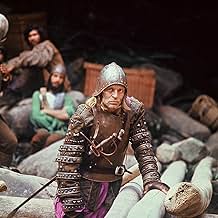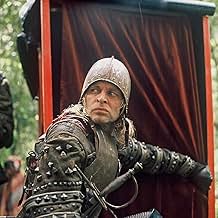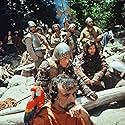IMDb RATING
7.8/10
66K
YOUR RATING
In the 16th century, the ruthless and insane Don Lope de Aguirre leads a Spanish expedition in search of El Dorado.In the 16th century, the ruthless and insane Don Lope de Aguirre leads a Spanish expedition in search of El Dorado.In the 16th century, the ruthless and insane Don Lope de Aguirre leads a Spanish expedition in search of El Dorado.
- Awards
- 4 wins & 3 nominations total
Claus Biederstaedt
- Brother Gaspar de Carvajal
- (voice)
- (uncredited)
Lothar Blumhagen
- Don Pedro de Ursua
- (voice)
- (uncredited)
Heinz Theo Branding
- Don Fernando de Guzman
- (voice)
- (uncredited)
Christian Brückner
- Balthasar
- (voice)
- (uncredited)
- Director
- Writer
- All cast & crew
- Production, box office & more at IMDbPro
Featured reviews
... in his pursuit of the gold of El Dorado while exhibiting incestuous thoughts towards his daughter and a belief he is god - with a supporting cast of treason, mutiny, murder, slavery, cannibalism and monkeys: you consider yourself fortunate not to have been part of the Spanish, or indeed any countries ruthless empire building in the past.
You are however grateful, for the vision and inspirational insight brought to you by Werner Herzog, leaving you transfixed by the pioneers plight, surroundings (visual and audible), naivety and ignorance in their futile quest for immortality and riches. When you couple all this with the challenges of the films gestation, the time of its inception and the instability and unpredictable nature of Klaus Kinski; that it was ever birthed in the first instance turns it into a treasure worth discovering, or rediscovering if you've mislaid your ability to explore new cinematic horizons.
You are however grateful, for the vision and inspirational insight brought to you by Werner Herzog, leaving you transfixed by the pioneers plight, surroundings (visual and audible), naivety and ignorance in their futile quest for immortality and riches. When you couple all this with the challenges of the films gestation, the time of its inception and the instability and unpredictable nature of Klaus Kinski; that it was ever birthed in the first instance turns it into a treasure worth discovering, or rediscovering if you've mislaid your ability to explore new cinematic horizons.
"Aguirre, the Wrath of God": Werner Herzog is one of my all-time favorite film makers, and this is one of my favorite films by him. Actually taken from the diary of the priest who accompanied Pizarro's expedition in 1560, Herzog recreates the pretentious and self-deluded search for the "Lost City of Gold - Eldorado".
Herzog likes true stories...ones that are bizarre in their own right, but with his direction and personal vision, they become profound (and never optimistic). The camera work is always interesting (he single-handedly "patented" camera shots that don't sweep - they ("you") stare and stare - and stare - at a thing or person or place until it becomes abstract, intense, beautiful, threatening, profound), the scoring is always appropriate yet never expected, and his casting, often using the unique talents of the late Klaus Kinski, guarantee nothing less than an intense experience...even in a film like "Aguirre", which SLOWLY claws and slogs it's way along each and every slippery, dangerous, foreign mile of jungle.
It is clear Herzog 'focuses' on the ridiculously high beliefs humans create for and hold of themselves - that they could actually "own" anything, "conquer" anything, outwit that which they do not understand, and by sheer Will cause anything they deem important, to exist. Herzog is NOT a cheerleader for the history of humans, but he is a ponderer... and we are fortunate he does it on film.
Herzog likes true stories...ones that are bizarre in their own right, but with his direction and personal vision, they become profound (and never optimistic). The camera work is always interesting (he single-handedly "patented" camera shots that don't sweep - they ("you") stare and stare - and stare - at a thing or person or place until it becomes abstract, intense, beautiful, threatening, profound), the scoring is always appropriate yet never expected, and his casting, often using the unique talents of the late Klaus Kinski, guarantee nothing less than an intense experience...even in a film like "Aguirre", which SLOWLY claws and slogs it's way along each and every slippery, dangerous, foreign mile of jungle.
It is clear Herzog 'focuses' on the ridiculously high beliefs humans create for and hold of themselves - that they could actually "own" anything, "conquer" anything, outwit that which they do not understand, and by sheer Will cause anything they deem important, to exist. Herzog is NOT a cheerleader for the history of humans, but he is a ponderer... and we are fortunate he does it on film.
Stunning, dreamlike film documents (in a somewhat documentary style), the story of Don Lope de Aguirre (Klaus Kinski), who leads a group of Spanish conquistadors into the depths of the jungle in search for El Dorado, the mythical city of gold. Beautiful cinematography and locations place the viewer into the heart of the jungle, where they witness firsthand Aguirre's descent into madness. Continually interesting and exciting, it features some of the greatest images ever committed to film, most notably the opening and closing shots of the movie.
A Spanish expedition is sent out to travel deep into the jungle and find the legendary city of El Dorado and recover its gold for the throne of Spain. Quickly the expedition gets into trouble and leader Don Pedro de Ursua decides that they must turn back. However to do this is not an option to Don Lope de Aguirre, who leads a violent rebellion, culling those loyal to Ursua and officially breaking off ties with Spain. The group continue down the river in search of their goal but conditions are hard and it is only the increasingly unrealistic aims of Aguirre that drives them onwards.
In both the film and the making of the film this is best sold as a medieval Apocalypse Now as it has a great collection of stories behind it while also being an interesting journey into the mouth of madness. The "making of" is told better other places than I can do here so I shan't bother, but suffice to say that at times the film feels like Herzog is just watching his cast to see what happens and not just following his characters. The plot sees them gradually fall from the pomp and civility that they start the film with and this is no surprise, but the manner in which it happens is still interesting and engaging. Some viewers may find it going where they expect it to, but this should not surprise anyone and it shouldn't stop the majority of people enjoying the journey.
Herzog's direction is strong throughout. He does well with what was a very difficult shoot and he gets plenty of strong shots out of it all of which still stand up as being impressive by today's standards. His direction of actors may not have been quite as good but the performances are still very good. Kinski is very strong in the lead role and, whether acting or not, he is totally convincing as he loses touch with reality. The support are all good, although Kinski is obviously where the picture is.
Overall an impressive film that is more worthwhile watching because of the stories behind it. The narrative may be simple and obvious enough but it is still very engaging as a journey or rather descent. Is maybe praised a little bit too highly by some but is a fascinating film regardless.
In both the film and the making of the film this is best sold as a medieval Apocalypse Now as it has a great collection of stories behind it while also being an interesting journey into the mouth of madness. The "making of" is told better other places than I can do here so I shan't bother, but suffice to say that at times the film feels like Herzog is just watching his cast to see what happens and not just following his characters. The plot sees them gradually fall from the pomp and civility that they start the film with and this is no surprise, but the manner in which it happens is still interesting and engaging. Some viewers may find it going where they expect it to, but this should not surprise anyone and it shouldn't stop the majority of people enjoying the journey.
Herzog's direction is strong throughout. He does well with what was a very difficult shoot and he gets plenty of strong shots out of it all of which still stand up as being impressive by today's standards. His direction of actors may not have been quite as good but the performances are still very good. Kinski is very strong in the lead role and, whether acting or not, he is totally convincing as he loses touch with reality. The support are all good, although Kinski is obviously where the picture is.
Overall an impressive film that is more worthwhile watching because of the stories behind it. The narrative may be simple and obvious enough but it is still very engaging as a journey or rather descent. Is maybe praised a little bit too highly by some but is a fascinating film regardless.
10mstomaso
Werner Herzog and Klaus Kinski's masterful achievement - Aguirre: The Wrath of God (Aguirre, der Zorn Gottes) is a rich and powerful film set deep in the the South American rain forest. Ostensibly a piece of historical fiction based on fragmentary evidence concerning one of the many ill-fated attempts to find and conquer the mythic El Dorado (a city of gold rumored to be anywhere from southern Canada to Patagonia), Aguirre operates on so many levels and reflects so many aspects of its story that it is difficult to convey precisely what the film is really about. It is too fictionalized (yet plausible) to fit comfortably in the "historical fiction" shoebox; the dialog is as much a presentistic bit of reflexive thinking as it is fitting for the historical context of the film; and the setting is so breathtaking that without a plot and without the brilliant concept and fantastic acting, the film would still be breathtaking and painful.
The opening scene, which very slowly depicts a caravan of Spanish soldiers, African and South American Indian slaves, burros, horses, cannons, and provisions making their way down a steep mountain path surrounded by miles of rain forest, is breathtaking and ominous, and sets not just the tone, but the pace of the film. Many people will find the pace a little too slow to handle. After a few minutes of struggle, the nobleman leader of the expedition throws in, and appoints a small number of participants to go forward into the jungle. Of these, only Lope Del Aguirre, a career soldier with vast ruthless ambition, and Ursua, a more gentle nobleman, are really leadership material. As the party floats down-river on rafts, it rapidly becomes clear by whose will the party continues on, and who will emerge as its sole leader in the end.
Herzog develops some of his usual themes in this film, and does so with poignancy and cinematography nothing short of beauty. The film is about power, madness, religion, oppression, nature, and culture, but certainly does not stop there. This is film as high art. Brilliantly executed, multi-faceted, moving, and as ambiguous as real life so often is.
This is also one of the great actor Klaus Kinski's most profound and appealing roles. Though Kinski was later typecast in mad, or at least eccentric, roles, as Aguirre he is able to show his range very effectively - because the character varies from a cold, brooding, Machiavellian rationalism to an obsessive sociopathic suicidalism. The rest of the cast rises to the challenge and acts right at Kinski's level, making this film one of the best actors/production team collaborations I have ever seen.
This film is definitely not for everybody, it is a long, slow sip of delicious and yet bitter wine which the typical movie-goer will only appreciate when 'in the mood' for something which requires thought and energy to watch. It is also one of my favorite films of all time.
The opening scene, which very slowly depicts a caravan of Spanish soldiers, African and South American Indian slaves, burros, horses, cannons, and provisions making their way down a steep mountain path surrounded by miles of rain forest, is breathtaking and ominous, and sets not just the tone, but the pace of the film. Many people will find the pace a little too slow to handle. After a few minutes of struggle, the nobleman leader of the expedition throws in, and appoints a small number of participants to go forward into the jungle. Of these, only Lope Del Aguirre, a career soldier with vast ruthless ambition, and Ursua, a more gentle nobleman, are really leadership material. As the party floats down-river on rafts, it rapidly becomes clear by whose will the party continues on, and who will emerge as its sole leader in the end.
Herzog develops some of his usual themes in this film, and does so with poignancy and cinematography nothing short of beauty. The film is about power, madness, religion, oppression, nature, and culture, but certainly does not stop there. This is film as high art. Brilliantly executed, multi-faceted, moving, and as ambiguous as real life so often is.
This is also one of the great actor Klaus Kinski's most profound and appealing roles. Though Kinski was later typecast in mad, or at least eccentric, roles, as Aguirre he is able to show his range very effectively - because the character varies from a cold, brooding, Machiavellian rationalism to an obsessive sociopathic suicidalism. The rest of the cast rises to the challenge and acts right at Kinski's level, making this film one of the best actors/production team collaborations I have ever seen.
This film is definitely not for everybody, it is a long, slow sip of delicious and yet bitter wine which the typical movie-goer will only appreciate when 'in the mood' for something which requires thought and energy to watch. It is also one of my favorite films of all time.
Did you know
- TriviaDuring a particularly rowdy night of production, Klaus Kinski, irritated by the noise from a hut where cast and crew were playing cards, repeatedly fired with a Winchester rifle into it. One of the bullets took the tip of an unnamed extra's finger off. Werner Herzog immediately confiscated the weapon and it remains his property to this day.
- GoofsThe indigenous Peruvians wear clothes that were imported by Europeans in the 19th century.
- Quotes
Don Lope de Aguirre: That man is a head taller than me. That may change.
- Alternate versionsThe early 2000's DVD release is missing the opening shot (after the text scroll) of the clouds parting to reveal the mountains. It simply opens on the shot following the line of people descending the narrow mountain trail. It also is missing the title credits over the river water. Earlier U.S. video versions were missing these titles as well, but kept the footage so that the film had several seemingly unmotivated long shots of the flowing water.
- ConnectionsEdited into Spisok korabley (2008)
- SoundtracksAguirre, Der Zorn Gottes (Lacrime Di Re)
Written by Florian Fricke
Performed by Popol Vuh
Published by Edition Intro Meisel
Courtesy of Gammarock Music
Details
- Release date
- Countries of origin
- Languages
- Also known as
- Aguirre, la ira de Dios
- Filming locations
- Huayna Picchu, Peru(mountain with stone stairway in the opening scene)
- Production companies
- See more company credits at IMDbPro
Box office
- Budget
- $370,000 (estimated)
- Gross worldwide
- $37,794
Contribute to this page
Suggest an edit or add missing content






























